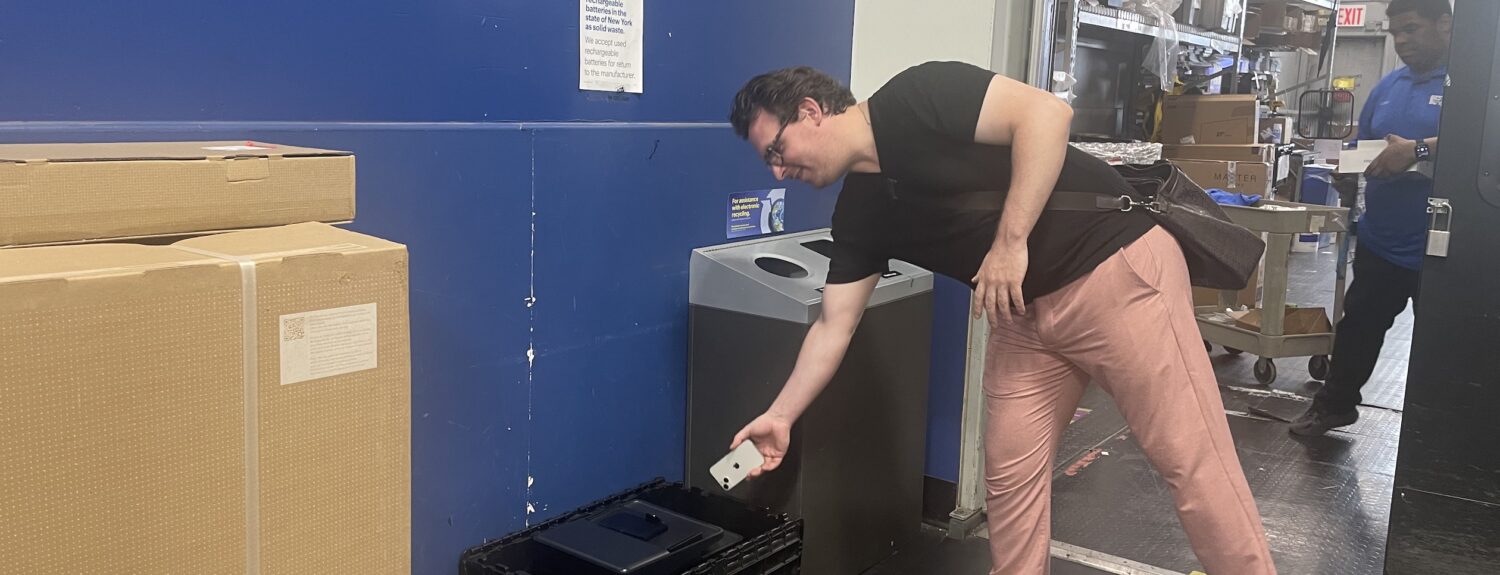Featured Articles
Repair, Reuse, Recycle: What to do with old phones?
By Mirabelle Zhang
For six years, Bonnie Soon has been using the same iPhone 8.
In her closet, five of her old cellphones are collecting dust. “Oh my God … I don’t know where to throw [them] out,” she said recently, while walking her dog in Washington Square Park.
According to a 2015 report from New York City’s Department of Consumer Affairs, 95.8% of New Yorkers used mobile phones. Nationwide, according to a 2021 Pew Research Center analysis, 97% of Americans owned cellphones.
Not all of them know what to do with their old devices.
“I don’t feel like I do a great job with electronics recycling, in general,” said Julia Ross, a lawyer who lives in NoHo. Since sixth grade, Ross has owned a Nokia, a Motorola Razr flip phone, an Android and several iPhones, including the one she still uses.
Ideally, she said, old electronics should be “taken apart and the parts … reused in some way.” (The World Counts suggests that 12.5% of cellphone and other electronic waste is recycled; 85% is incinerated, releasing harmful toxins, or dumped into landfills.)
For now, Ross keeps most of her old phones in their original boxes in her closet. She has recycled some phones that had been “truly broken” by dropping them off at Best Buy or Verizon stores.
At the Best Buy near the intersection of Broadway and Houston Street, there’s a single “recycling” sign. It’s a laminated sheet of 8.5 inch-by-11 inch printer paper, taped onto a wall between the customer service desk and the stockroom. An arrow points down toward a black plastic crate. Laptops, cellphones and assorted electronics can be deposited there.
The crate is emptied daily into two, giant wall-to-wall bins, store manager Antonio Velez said. Every week, a recycling company’s truck carts those discarded electronics off to a recycling center. Velez was unsure of the names and details of the recycling company.
New York State law requires cellphone retailers to accept mobile phones for recycling. Phones and other electronic devices are made with precious, sometimes dangerous metals, and shouldn’t be thrown out in the garbage.
“We see a lot of laptops, old computers, stuff like that. It varies. We don’t really keep track of what we recycle, like, with phones or anything, because it’s just a big bin,” Velez said.
On Canal Street, Kimi iPhone Repair and Accessories shares a space with a dozen tables full of gold and silver-toned jewelry spilling out onto the sidewalk. Owner Kimi Ding stands beside a wall of multicolored phone cases. Ding’s recent fixes mainly have been to iPhone 11s. Released in September 2019, those phones generally are three to four years old.
Mostly, Ding repairs his clients’ broken screens, replaces their batteries and undoes water damage. Some of them, he said, “drop their phones all the time, like, two months, three months.”
Kai Banda is one such serial phone-dropper. Banda, 19, got his first cellphone when he was 10 or 11. He recounted how many he’s had since then.
“Probably around … ” he paused.
“Almost … ” he paused again.
“Ten different phones? Or, maybe a bit less, like, eight … or so. Because I got an iPhone 5, I think, and now it’s up to an iPhone 13. So probably, like, six. Or, six to seven, maybe? I’m not sure.”
Then, he explained why he replaced his previous phones: “Usually, the battery life gets really bad. And sometimes I dropped my phone and the screen cracks. That happened a couple of times.”
To the people who break their phones beyond repair, “I just tell them, buy the new one,” Ding said.
In 2020, Americans spent an average of almost 4.5 hours a day on their phones, according to a Viasat Savings survey of 1,000 people. Simply Texting’s 2021 survey of 2,603 Americans found that New Yorkers spent an average of 5.03 hours a day on their phones. In Reviews.org’s 2023 survey of 1,000 people, more than half of Americans said they were “addicted” to their phones.
Edward Wong, a Georgetown University student visiting NYU’s campus, said that he keeps old phones that he hasn’t traded in as backup. “But since they’re already half broken, there’s really no point in keeping them,” he said.
None of the people who this reporter interviewed have a sentimental attachment to the phones they are holding onto. They just don’t know what else to do with them.


